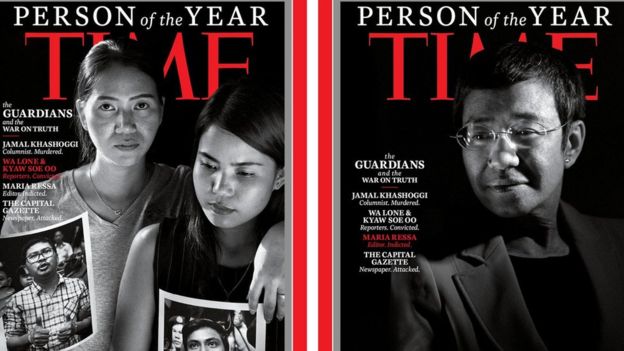
(Excerpted from BBC) Killed and imprisoned journalists – “The Guardians'” – have been named 2018’s “Person of the Year” by Time.
The magazine featured four different covers with journalists who have been targeted for their work this year.
They include Jamal Khashoggi who was killed in the Saudi embassy in Turkey.
Staff from Capital Gazette, the US newspaper where five people were killed, are featured, along with Maria Ressa of the Philippines and the wives of Myanmar’s Wa Lone and Kyaw Soe Oo.
Time said they were chosen “for taking great risks in pursuit of greater truths, for the imperfect but essential quest for facts, for speaking up and for speaking out”.
Who are the journalists?
Jamal Khashoggi
Jamal Khashoggi was a well-known Saudi journalist and vocal critic of the Saudi Arabian leadership. He disappeared after entering a Saudi consulate in Istanbul in October.

The Saudi authorities have admitted he was killed inside the building on the orders, they say, of rogue intelligence officers.
But many in the international community believe he was killed on the orders of the Saudi Crown Prince Mohammed bin Salman, known as MBS, of whom he had been critical.
Mr Khashoggi had been in self-imposed exile in the US, from where he wrote a column for the Washington Post. He was in Istanbul seeking documentation so he could marry his Turkish fiancee.
The killing has led to international condemnation of Saudi Arabia, but US President Trump and his administration have refrained from joining others in blaming MBS. The CIA is reported to have concluded the killing was ordered by MBS, but Mr Trump’s son-in-law Jared Kushner told Fox News that US intelligence agencies were still “making their assessments”.
Capital Gazette staff
A gunman walked into the offices of the Capital Gazette in Annapolis, Maryland, on 28 July and killed five members of editorial staff.
The suspect had a longstanding grudge against the newspaper after unsuccessfully suing it for defamation in 2012, investigators later said.
Despite the horror that unfolded in their workplace, staff worked in the car park to put out an edition the next day. As well as publishing the obituaries of their colleagues, they left the editorial page blank with a note saying they were speechless.
Maria Ressa and Rappler
Former CNN journalist Maria Ressa founded her online news site Rappler in the Philippines in 2012, and it has since gained a reputation for hard-hitting, investigative journalism.
It has been openly critical of President Rodrigo Duterte, questioning the accuracy of his public statements, particularly over his deadly war on drugs.
A few months after his election in 2016, Rappler published a detailed report into allegations that automated bots and fake Facebook accounts were used to amplify the pro-Duterte message – something the president’s team denied.
Mr Duterte has labelled the site’s reports as “twisted” and banned its political reporter from entering the presidential offices.
In January this year, Rappler had its licence revoked by the state, igniting a national debate about press freedom.
This November, Maria Ressa and her news site were accused of tax evasion – something she said was a “clear form of continuing intimidation and harassment”.
Wa Lone and Kyaw Soe Oo
Reuters journalists Wa Lone and Kyaw Soe Oo, both citizens of Myanmar, were sentenced to seven years in jail in September for violating a state secrets act.
It stemmed from their work in September 2017 investigating the murders of 10 Rohingya men by the army in the northern Rakhine village of Inn Dinn.
The two journalists were arrested in December 2017 while carrying official documents they had been given by two police officers. They have always maintained their innocence and say they were set up by the police.
The case has been widely seen as a test of press freedom in Myanmar.
Aung San Suu Kyi, who was once seen as a beacon of human rights and democracy, has faced international condemnation for her government’s handling of the case.
She defended the verdict saying the two journalists had broken the law and that their conviction had “nothing to do with freedom of expression at all”.
























